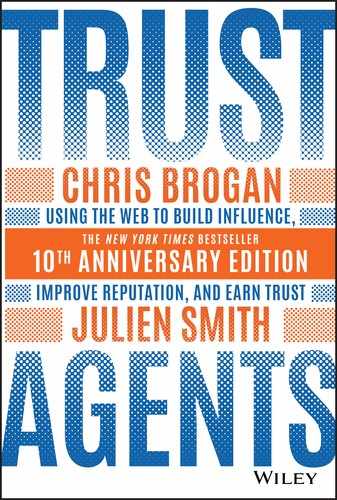Introduction
The year 2020 feels like the future. There are video games and sci-fi movies and songs and comic books that all talk this year as if it's some very far off event. But now we're here. Look how.
On this day, Julien had a jar of kimchi explode in his kitchen. Chris still has some laundry to get done. We're writing this while communicating over Google Meet, which used to be Google Hangouts, which used to be part of Google+, a social network that came and went since we last updated this book, as have many others. Did we know any of this, specifically, would happen? Of course not. But a lot of what you'll see in this book (surprising amounts, even to us), we did, and went even further than we could have anticipated.
The future is faster and more chaotic than we could've predicted, even though Trust Agents came out back in 2009. Technically, it's a bit more than 10 years ago but not yet 11.
So let's talk about the future.
We Had Lots of Predictions, Hunches, and Ideas
Sift through what we said way back in 2009 and before that on our blogs to see that we were living in a time where we felt it was more than possible that companies would adopt social media and social networking tools to build better relationships with customers and other stakeholders. (We were right. That's kind of cool to see.)
Companies did, as we stated, hire more and more people to interact with people via social networks and the digital web. Friends like Ryan Boyles over at IBM and Sandy Carter at Amazon are even more prevalent than the days when we first wrote this book.
We never would have guessed that social networks would be used to challenge governments and regimes in events such as Arab Spring and the Hong Kong protests and beyond. We could never have seen that they would become among the most powerful, and influential businesses in the world, globally.
We had no idea that Mark Zuckerberg would have to testify before Congress (“Senator, we run ads.”), and would become the new, old Bill Gates. We had no idea that Jeff Bezos would buy the Washington Post or that the New York Times would reverse its descent from print soon to be making $800 million a year in digital revenue. We didn't know how powerful Twitter would become to influence people's ideas (despite being a business 20 times smaller than Facebook).
We couldn't sense that Spotify, Apple, and streaming would become the main way people consume audio content (including – through Shopify's acquisition of Anchor—podcasts). We didn't know that Joe Rogan (or anyone) would become as big as they are strictly from podcasting. None of this was knowable—but surprisingly, even to us, in 2009, it was implied by the direction that year was going.
Look more and you'll see that we grossly overstated the future benefit of blogs! Julien doesn't blog any longer. He wrote three books, two with Chris, then started Breather.com, a flexible office space business that raised $150 million and grew it into a thriving—and still scrappy—multinational. Chris blogs infrequently. It turns out that podcasts and video channels are a lot more popular than when we wrote this. And while we still don't recommend it, people take to sites like Facebook and LinkedIn (now very much more a media site) and Medium to write their posts and voice their ideas. The world is going flat and nonhierarchical, while at the same time being even more unequal than it has ever been.
One voice is even more powerful in 2020 than it was in 2009. But is it a real voice? You probably won't be surprised if we tell you that, if you went to ThisPersonDoesNotExist.com, you can view a completely convincing portrait of what is not at all a human, but instead a computer-generated unique facsimile. Once you leave the site, that face ceases to exist (and will never appear again). So was that a real person? No! But it sure did look like one, and it sure could convince the everyday Internet citizen. That's trust, today.
Is that scary? It is, right? Of course, but at the same time, scary and normal have occasionally become the same thing. It's sort of like a William Gibson novel, yet every day, we humans grapple with the new, adapt to it, and find ways to make it work for us and make business around it.
That, ultimately, is what Trust Agents was about, although we didn't know it that well then. Technology is a medium, and the social web at that time was a nascent one, growing and fragile. Now, it's dominant. But trust is even more powerful online, and even easier to leverage, to create powerful business opportunities, than it was in 2020.
Thus, although some technology has changed, humans mostly have not. So let's talk about them, and how to be human, both vulnerable and powerful, online—and what it can do for you.
